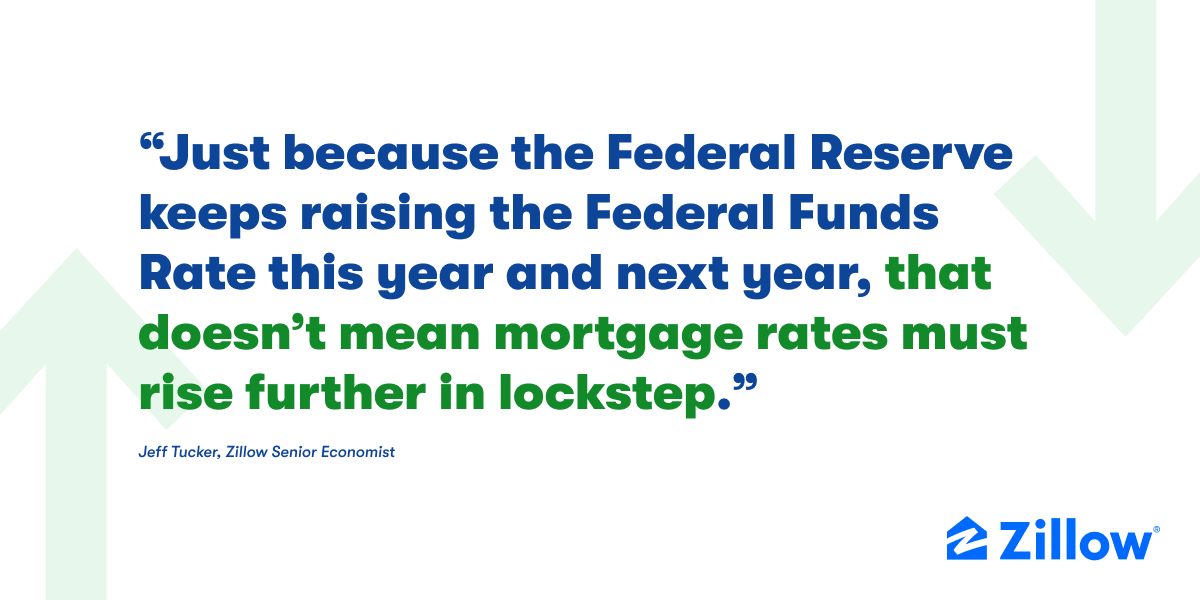During periods of inflation, buying a home can offer a way to stabilize housing costs for decades to come.

Today’s housing market looks a lot different than it did when the year started, with buyers and sellers adjusting to the twin realities of high inflation and spiking mortgage interest rates.
While the market remains a hot one for sellers, there are signs the tide has turned. Zillow research found that ballooning mortgage costs and rising home prices have begun to cool buyer demand for homes. As a result, more sellers are cutting their prices and homes are taking longer to sell. The number of homes buyers can choose from is rising quickly from the historic lows of February.
The wildcard is fast-rising inflation, which reduces the buying power of money.
Given the run-up in consumer prices over the past several months, it’s easy to wonder whether buying (or selling) a house may be a good move during a time of inflation.
Whether current conditions make it a good time for you to buy or sell depends on your personal circumstances. But to help you answer that question and others, we turned to Zillow senior economist Jeff Tucker, who offers some big-picture takeaways that can help you weigh your choices as you move forward.
How does inflation affect home prices?
Inflation is very high right now. In June, the annual rate of inflation hit 9.1%, as measured by the Consumer Price Index. The index reflects the average change in prices for a variety of goods and services over a period of time.
Several things are driving rising prices: the strong U.S. economy, low unemployment, rising wages and high demand for consumer goods. Complicating the picture are lingering disruptions to global supply chains from COVID-19, the war in Ukraine and escalating energy prices.
The Federal Reserve, the nation’s central bank, is trying to tamp down inflation by raising a key interest rate that affects rates on a variety of financial products, including mortgages.
“Higher mortgage interest rates make homeownership more expensive, even if prices remain the same,” Tucker says. “That dampens demand from buyers, causing them to look for lower-cost home options or stop house-hunting altogether.”
Fewer buyers can lead to price cuts for listed homes, he says. It can also boost inventory because homes stay on the market longer.
If rates continue to rise, buyers still in the hunt for a home are likely to find less competition..
I’ve heard real estate can be a hedge against inflation. What does that mean?
“Real estate can be considered a hedge against inflation because it offers people a way to lock in a major part of their monthly budget: the cost of shelter,” Tucker says. “Homeowners who have a fixed-rate mortgage can be assured of paying the same monthly mortgage bill in 20 years as they pay today.”
Taxes, insurance and homeowner association fees may change over time, of course. But the bulk of your monthly payment — the principal and interest on the original loan — remains the same with a fixed-interest loan until it’s paid off.
Do home prices drop when mortgage interest rates rise?
Not always.
It’s hard to say whether or how much prices will drop as interest rates climb. Recent Zillow research found that “skyrocketing prices and interest rates have made mortgages less affordable than at any time since at least 2007. Demand for homes has pulled back in response, easing price growth, slowing sales and boosting inventory.”
Tucker says research from the Urban Institute found that, historically, high mortgage rates tend to be associated with periods of strong economic growth, low employment, strong wage growth and high inflation. These conditions usually mean that people have more money to spend so they’re also associated with increases, not decreases, in home prices.
The one exception cited in the research: rapid increases in mortgage rates like the ones we’ve experienced recently are historically associated with slower home price appreciation, he says.
How high are interest rates likely to go, and how long will they stay there?
No one really knows.
“Many forecasters are surprised by how far they’ve already risen,’’ Tucker says. “One important fact to keep in mind is that, just because the Federal Reserve keeps raising the Federal Funds Rate this year and next year, that doesn’t mean mortgage rates must rise further in lockstep.”
Tucker says that lenders who are anticipating additional rate increases will likely have already priced those increases into the rates and fees they charge.
Are adjustable rate mortgages (ARMs) a better deal right now than 30-year-fixed?
That depends on the loan and what happens to interest rates in the longer term.
“ARMs, on average, provide a lower interest rate in the short term, but that rate is only available for a certain period,’’ Tucker says. “After the introductory fixed-rate period ends, there’s a possibility that the interest rate on the ARM will reset to a higher rate.”
He noted that, as of July 18, Mortgage News Daily estimated that the initial rate on a typical 5/1 ARM was nearly a third of a percentage point lower than the interest rate on a typical 30-year fixed-rate mortgage.

Tucker says buyers should look at the entire loan package when making comparisons. Give special attention to the differences in fees when comparing ARMs and fixed-rate options.
Also, if you’re thinking of taking out an ARM and planning to refinance later, you should consider how long you plan to live in the home and whether a future sale will likely cover the cost of refinancing.
As a homeowner, is it better to refinance my mortgage right now or take out an HELOC?
HELOC stands for Home Equity Line of Credit, which is an adjustable rate home loan that lets you tap the equity in your home. You access it much like you would a credit card.
“Under today’s market conditions, there’s a lot to recommend in a HELOC,’’ Tucker says. “It can provide the flexibility to borrow more or less at different times. If you refinance, you’re basically resetting a potentially large amount of mortgage debt with a new interest rate that will almost certainly be higher than the one on your current mortgage.”
How does inflation and the current housing market affect me if I’m looking to sell?
If you’re selling and buying your next home, you’ll almost certainly pay a higher interest rate if you’re financing the purchase with a mortgage. For some homeowners, the rate could be as much as 3 or 4 percentage points higher.
Sellers called the shots for nearly two years. Now they’re facing challenges. Price growth has slowed as sellers begin to see the emerging picture of what buyers will actually be able to pay for their home.
If you’re selling, work with your agent to price your home so that it reflects the realities of the market. If sellers are cutting their prices, you want to be sure to price yours competitively to attract the best offers.
What other things should I consider?
“If you need to move for a job or changing family needs or just to start a new chapter, ask yourself if you can afford the home you’re looking at with today’s mortgage rates and if you will love living there for several years,’’ Tucker says. “Those are the most important things to establish. In many ways, the movement of prices and interest rates in the years ahead will be irrelevant if you’re happy in your home.”


